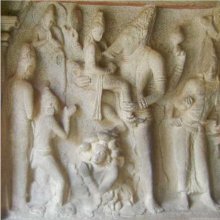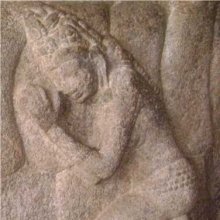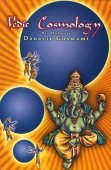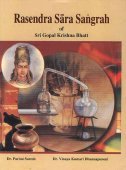Bhu, Bhū: 28 definitions
Introduction:
Bhu means something in Hinduism, Sanskrit, Jainism, Prakrit, Buddhism, Pali, the history of ancient India, Marathi, Hindi. If you want to know the exact meaning, history, etymology or English translation of this term then check out the descriptions on this page. Add your comment or reference to a book if you want to contribute to this summary article.
Images (photo gallery)
In Hinduism
Natyashastra (theatrics and dramaturgy)
Source: archive.org: The mirror of gesture (abhinaya-darpana)One of the Hands of The Seven Upper Worlds.—Bhu: the Patāka hand twisted upwards is applicable.

Natyashastra (नाट्यशास्त्र, nāṭyaśāstra) refers to both the ancient Indian tradition (shastra) of performing arts, (natya—theatrics, drama, dance, music), as well as the name of a Sanskrit work dealing with these subjects. It also teaches the rules for composing Dramatic plays (nataka), construction and performance of Theater, and Poetic works (kavya).
Purana and Itihasa (epic history)
Source: archive.org: Puranic EncyclopediaBhū (भू).—(bhūḥ) In the creation of the world, the Lord broke the beginningless "Aṇḍa" (the primal egg or seed) and from it the sound "Oṃ" emerged. The first sound of it was "BHŪḤ"; the second was "BHUVAḤ"; and the third was "SVAḤ". So the combination "Bhūr Bhuvaḥ Svaḥ" was formed. Then came the most adorable and superlative effulgence of the creator (Savitā). That radiance dried up all water. A little of the water became a highly viscous substance. This viscous matter gradually solidified and became the earth. Where the aṇḍa originally was became the source of that supreme effulgence. As it was the first radiant light, it came to be called Āditya (ādi=first). The great procreator Brahmā seemed to emerge from the centre of the aṇḍa. The garbhajala (the water contained in the aṇḍa) became the oceans and rivers of the world. (Vāmana Purāṇa, Chapter 43).
Source: Cologne Digital Sanskrit Dictionaries: The Purana Index1a) Bhū (भू).—Earth: (Bhūmi) one of the seven worlds; released from Rasātala by Hari in Varāha form, this, Devī worships Hari in that form in Uttara-Kuru;1 when Pṛthu wanted to punish her for scarce supply of food, she trembled and appealed to him to make the ground level plain and milk her with a calf and a pail; was milked by the King, sages, Gods, asuras and others; hilly tracts got levelled, and cities and villages were founded.2 Bhū is said to have given yogic pādukas to Pṛthu.3 presiding deity is Agni; burnt by pralaya fire;4 the measurement of the earth (Pramāṇam) attempted by Haryaśvas (s.v.).5
- 1) Bhāgavata-purāṇa IV. 17. 34; Matsya-purāṇa 60. 2.
- 2) Bhāgavata-purāṇa IV. 17. 13-36; 18. 2-32.
- 3) Ib. IV. 15. 18.
- 4) Brahmāṇḍa-purāṇa II. 19. 155; 21. 21; IV. 1. 156; 2. 9-19, 41, 223.
- 5) Matsya-purāṇa 5. 6.
1b) (Samiti) a Kṛtaloka, the first world; first was said Bhū and then came this world;1 is Pārthiva loka;2 these lokas are burnt by the flames of the seven suns;3 Marīci, Kaśyapa, Dakṣa and other Prajāpatis live here;4 people here live on rice and juice.5
- 1) Vāyu-purāṇa 23. 107; 24. 18. 101. 11, 35-36.
- 2) Ib. 101. 18.
- 3) Ib. 101. 20.
- 4) Ib. 101. 34.
- 5) Ib. 101. 40, 42.

The Purana (पुराण, purāṇas) refers to Sanskrit literature preserving ancient India’s vast cultural history, including historical legends, religious ceremonies, various arts and sciences. The eighteen mahapuranas total over 400,000 shlokas (metrical couplets) and date to at least several centuries BCE.
Jyotisha (astronomy and astrology)
Source: Wikibooks (hi): Sanskrit Technical TermsBhū (भू).—1. Base of a triangle. 2. Earth. Note: Bhū is a Sanskrit technical term used in ancient Indian sciences such as Astronomy, Mathematics and Geometry.

Jyotisha (ज्योतिष, jyotiṣa or jyotish) refers to ‘astronomy’ or “Vedic astrology” and represents the fifth of the six Vedangas (additional sciences to be studied along with the Vedas). Jyotisha concerns itself with the study and prediction of the movements of celestial bodies, in order to calculate the auspicious time for rituals and ceremonies.
Ayurveda (science of life)
Nighantu (Synonyms and Characteristics of Drugs and technical terms)
Source: Wisdom Library: Raj NighantuBhū (भू) refers to “earth” and is mentioned in a list of 53 synonyms for dharaṇi (“earth”), according to the second chapter (dharaṇyādi-varga) of the 13th-century Raj Nighantu or Rājanighaṇṭu (an Ayurvedic encyclopedia). The Dharaṇyādi-varga covers the lands, soil [viz., Bhū], mountains, jungles and vegetation’s relations between trees and plants and substances, with their various kinds.
Bhū is also a synonym for Deśa (“region”), according to the second chapter (dharaṇyādi-varga) of the 13th-century Raj Nighantu or Rājanighaṇṭu (an Ayurvedic encyclopedia).
Unclassified Ayurveda definitions
Source: gurumukhi.ru: Ayurveda glossary of termsBhū (भू):—Earth: the proto-element

Āyurveda (आयुर्वेद, ayurveda) is a branch of Indian science dealing with medicine, herbalism, taxology, anatomy, surgery, alchemy and related topics. Traditional practice of Āyurveda in ancient India dates back to at least the first millenium BC. Literature is commonly written in Sanskrit using various poetic metres.
Vastushastra (architecture)
Source: OpenEdition books: Architectural terms contained in Ajitāgama and RauravāgamaBhū (भू) [or bhūmi] refers to “- 1. site § 2.18. - 2. level § 3.12.”.—(For paragraphs cf. Les enseignements architecturaux de l'Ajitāgama et du Rauravāgama by Bruno Dagens)

Vastushastra (वास्तुशास्त्र, vāstuśāstra) refers to the ancient Indian science (shastra) of architecture (vastu), dealing with topics such architecture, sculpture, town-building, fort building and various other constructions. Vastu also deals with the philosophy of the architectural relation with the cosmic universe.
Shaktism (Shakta philosophy)
Source: Google Books: ManthanabhairavatantramBhū (भू) refers to “heaven”, according to the Manthānabhairavatantra, a vast sprawling work that belongs to a corpus of Tantric texts concerned with the worship of the goddess Kubjikā.—Accordingly, “ The sacred seat Jāla is the Unmanifest. It is well placed in the southern quarter. [...] The sacred seat (i.e. maṭha?) Ūṣma, very fierce, is pure in heaven [i.e., bhū] and on the earth. The gesture is Vikārālyā, which removes the fear of phenomenal existence. Conjoined with the (secret) language and the Choma, this is the unstruck sound of Jālāvvā. Well known as the Vidyā, the three worlds bow to it. Accomplished, divine, with six faces, giving supreme bliss, the guardian of the field is called ‘Jaya’. I praise the sacred seat Jāla, revered by the gods, which is divided into sixteen divisions”.

Shakta (शाक्त, śākta) or Shaktism (śāktism) represents a tradition of Hinduism where the Goddess (Devi) is revered and worshipped. Shakta literature includes a range of scriptures, including various Agamas and Tantras, although its roots may be traced back to the Vedas.
Ganitashastra (Mathematics and Algebra)
Source: archive.org: Hindu MathematicsBhū (भू) represents the number 1 (one) in the “word-numeral system” (bhūtasaṃkhyā), which was used in Sanskrit texts dealing with astronomy, mathematics, metrics, as well as in the dates of inscriptions and manuscripts in ancient Indian literature.—A system of expressing numbers by means of words arranged as in the place-value notation was developed and perfected in India in the early centuries of the Christian era. In this system the numerals [e.g., 1—bhū] are expressed by names of things, beings or concepts, which, naturally or in accordance with the teaching of the Śāstras, connote numbers.

Ganitashastra (शिल्पशास्त्र, gaṇitaśāstra) refers to the ancient Indian science of mathematics, algebra, number theory, arithmetic, etc. Closely allied with astronomy, both were commonly taught and studied in universities, even since the 1st millennium BCE. Ganita-shastra also includes ritualistic math-books such as the Shulba-sutras.
Yoga (school of philosophy)
Source: ORA: Amanaska (king of all yogas): A Critical Edition and Annotated Translation by Jason BirchBhū (भू) refers to the “earth”, according to the Śivayogadīpikā, an ancient Sanskrit text dealing with Yoga possibly corresponding to the Śivayoga quoted in Śivānanda’s Yogacintāmaṇi.—Accordingly, [while describing a sequence of Haṭhayoga practices]: “Thus, by means of this Haṭhayoga which has eight auxiliaries, those [students who are] life-long celibates obtain the Siddhis of the [best of Sages] because of their untiring practice. [...] In the seventh year, he can leave the earth (bhū—tyajed bhuvaṃ) and in the eighth [year], the [yogic] powers [such as minimization, etc.,] arise for him. In the ninth year, he can move in the atmosphere, travel in [all] directions and has a body [as hard as] a diamond. [...]”.

Yoga is originally considered a branch of Hindu philosophy (astika), but both ancient and modern Yoga combine the physical, mental and spiritual. Yoga teaches various physical techniques also known as āsanas (postures), used for various purposes (eg., meditation, contemplation, relaxation).
In Jainism
General definition (in Jainism)
Source: The University of Sydney: A study of the Twelve ReflectionsBhū (भू) refers to “earth”, according to the Yaśastilaka Campū verse 2.123-214.—Accordingly, “Never imagine that thou art composed of the body, because the body is utterly different from thee. Thou art all consciousness, an abode of virtue and bliss; whereas the body, because it is inert, is an unconscious mass (gatadhī-kāya—jaḍatayā gatadhīnikāyaḥ). The body exists and grows so long as thou art in existence. When thou art dead, it disappears in the form of earth, air and the like [i.e., bhū—bhūpavanādirūpaiḥ]. Composed of the elements it is devoid of feelings such as joy, like a corpse. Hence the blissful self is surely different from the body.
Synonyms: Pṛthvī, Dhātrī.

Jainism is an Indian religion of Dharma whose doctrine revolves around harmlessness (ahimsa) towards every living being. The two major branches (Digambara and Svetambara) of Jainism stimulate self-control (or, shramana, ‘self-reliance’) and spiritual development through a path of peace for the soul to progess to the ultimate goal.
India history and geography
Source: Cologne Digital Sanskrit Dictionaries: Indian Epigraphical GlossaryBhū.—(IA 17), a land measure; equal to four bhū-māṣakas. See bhūmi. (EI 9), a land measure or a plot of land. (IE 7-1-2; EI 15, 25), ‘one’. Note: bhū is defined in the “Indian epigraphical glossary” as it can be found on ancient inscriptions commonly written in Sanskrit, Prakrit or Dravidian languages.

The history of India traces the identification of countries, villages, towns and other regions of India, as well as mythology, zoology, royal dynasties, rulers, tribes, local festivities and traditions and regional languages. Ancient India enjoyed religious freedom and encourages the path of Dharma, a concept common to Buddhism, Hinduism, and Jainism.
Languages of India and abroad
Pali-English dictionary
Source: BuddhaSasana: Concise Pali-English Dictionarybhū : (f.) the earth.
Source: Sutta: The Pali Text Society's Pali-English Dictionary1) Bhū, 2 (f.) (fr. bhū, otherwise bhūmi) the earth; Loc. bhuvi according to Kaccāyana; otherwise bhuvi is aor. 3rd sg. ; of bhū: see Pischel, Prk. Gr. § 516; Geiger, Pali Gr. § 865. (Page 507)
2) Bhū, 1 (fr. bhū) (adj.) being, (n.) creature, living being in pāṇa-bhū a living being (a breathing being) J. V, 79 (=pāṇa-bhūta C.). (Page 507)

Pali is the language of the Tipiṭaka, which is the sacred canon of Theravāda Buddhism and contains much of the Buddha’s speech. Closeley related to Sanskrit, both languages are used interchangeably between religions.
Marathi-English dictionary
Source: DDSA: The Molesworth Marathi and English Dictionarybhū (भू).—f (S) The terraqueous globe.
--- OR ---
bhū (भू).—a S In comp. Produced from or springing from; as padmabhū Produced from the lotus; svayambhū Springing from self, self-existent. Also under its first meaning many compounds are formed with it; as bhūpati, bhūdēva, bhūlōka, bhūcara, bhūdāna, bhūkampa.
Source: DDSA: The Aryabhusan school dictionary, Marathi-Englishbhū (भू).—f The earth a Produced from. In Comp.
Marathi is an Indo-European language having over 70 million native speakers people in (predominantly) Maharashtra India. Marathi, like many other Indo-Aryan languages, evolved from early forms of Prakrit, which itself is a subset of Sanskrit, one of the most ancient languages of the world.
Sanskrit dictionary
Source: DDSA: The practical Sanskrit-English dictionaryBhū (भू).—I. 1 P. (rarely Ā.) (bhavati, babhūva, abhūt, bhaviṣyati, bhavitum, bhūta)
1) To be, become; कथमेवं भवेन्नाम (kathamevaṃ bhavennāma); अस्याः किमभवत् (asyāḥ kimabhavat) Mālatīmādhava (Bombay) 9.29 'what has become her fate', 'what has become of her' Uttararāmacarita 3.27; यद्भावि तद्भवतु (yadbhāvi tadbhavatu) Uttararāmacarita 3 'come what may'; so दुःखितो भवति, हृष्टो भवति (duḥkhito bhavati, hṛṣṭo bhavati) &c.
2) To be born or produced; यदपत्यं भवेदस्याम् (yadapatyaṃ bhavedasyām) Manusmṛti 9.127; भाग्यक्रमेण हि धनानि भवन्ति यान्ति (bhāgyakrameṇa hi dhanāni bhavanti yānti) Mṛcchakaṭika 1.13.
3) To spring or proceed from, arise; क्रोधाद् भवति संमोहः (krodhād bhavati saṃmohaḥ) Bhagavadgītā (Bombay) 2.63;14.17.
4) To happen, take place, occur; नाततायिवधे दोषो हन्तुर्भवति कश्चन (nātatāyivadhe doṣo hanturbhavati kaścana) Manusmṛti 8.351; यदि संशयो भवेत् (yadi saṃśayo bhavet) &c.
5) To live, exist; अभूदभूतपूर्वः (abhūdabhūtapūrvaḥ) ... राजा चिन्तामणिर्नाम (rājā cintāmaṇirnāma) Vās.; अभून्नृपो विबुधसखः परंतपः (abhūnnṛpo vibudhasakhaḥ paraṃtapaḥ) Bhaṭṭikāvya 1.1.
6) To be alive or living, breathe; त्वमिदानीं न भविष्यसि (tvamidānīṃ na bhaviṣyasi) Ś.6; आः चारुदत्तहतक, अयं न भवसि (āḥ cārudattahataka, ayaṃ na bhavasi) Mṛcchakaṭika 4; दुरात्मन्, प्रहर नन्वयं न भवसि (durātman, prahara nanvayaṃ na bhavasi) Mālatīmādhava (Bombay) 5 ('thou art a dead man', thou shalt breathe no longer); ऋतेऽपि त्वा न भविष्यन्ति सर्वे (ṛte'pi tvā na bhaviṣyanti sarve) Bhagavadgītā (Bombay) 11.32.
7) To remain or be in any state or condition, fare; भवान् स्थले कथं भविष्यति (bhavān sthale kathaṃ bhaviṣyati) Pañcatantra (Bombay) 2.
8) To stay, abide; remain; अस्मिन्नेव लतागृहे त्वमभवस्तन्मार्ग- दत्तेक्षणः (asminneva latāgṛhe tvamabhavastanmārga- dattekṣaṇaḥ) Uttararāmacarita 3.37.
9) To serve, do; इदं पादोदकं भविष्यति (idaṃ pādodakaṃ bhaviṣyati) Ś.1.
1) To be possible (usually with a future tense in this sense); भवति भवान् याजयिष्यति (bhavati bhavān yājayiṣyati) Sk.
11) To lead or tend to, conduce to, bring about (with dat.); वाताय कपिला विद्युत् (vātāya kapilā vidyut) ...... पीता भवति सस्याय दुर्भिक्षाय सिता भवेत् (pītā bhavati sasyāya durbhikṣāya sitā bhavet) Mahābhārata ; सुखाय तज्जन्मदिनं बभूव (sukhāya tajjanmadinaṃ babhūva) Kumārasambhava 1.23; संस्मृतिर्भव भवत्यभवाय (saṃsmṛtirbhava bhavatyabhavāya) Ki. 18.27; न तस्या रुचये बभूव (na tasyā rucaye babhūva) R.6.44.
12) To be on the side of, assist; देवा अर्जुनतोऽभवन् (devā arjunato'bhavan) |
13) To belong or pertain to (often expressed by 'have'); तस्य ह शतं जाया बभूवुः (tasya ha śataṃ jāyā babhūvuḥ) Ait. Br.; तस्य तेजोमया लोका भवन्ति ब्रह्मवादिनः (tasya tejomayā lokā bhavanti brahmavādinaḥ) Manusmṛti 6.39.
14) To be engaged in, be occupied (with loc); चरण- क्षालने कृष्णो ब्राह्मणानां स्वयं ह्यभूत् (caraṇa- kṣālane kṛṣṇo brāhmaṇānāṃ svayaṃ hyabhūt) Mb.
15) To conduct oneself, behave.
16) Ved. To be prosperous, succeed; ततो देवा अभवन् (tato devā abhavan) Bṛ. Up 1.3.7; Mahābhārata (Bombay) 12.228.1. Used with a preceding noun or adjective भू (bhū) serves to form verbs in the sense of 'becoming what it previously is not' or 'becoming' in general; श्वेतीभू (śvetībhū) to become white; कृष्णीभू (kṛṣṇībhū) to become black; पयोधरीभूत (payodharībhūta) 'becoming or serving the purpose of teats'; so क्षपणीभू (kṣapaṇībhū) to be or become a mendicant; प्रणिधीभू (praṇidhībhū) to act the spy; आर्द्रीभू (ārdrībhū) to melt; भस्मीभू (bhasmībhū) to be reduced to ashes; विषयीभू (viṣayībhū) to form the subject of; so एकमतीभू (ekamatībhū); तरुणीभू (taruṇībhū) &c. &c. Note-- The senses of भू (bhū) may be variously modified according to the adverbs with which it is connected; e. g. पुनर्भू (punarbhū) to marry again; आविर्भू (āvirbhū) to appear, arise, to be evident or clear; see आविस् (āvis); तिरोभू (tirobhū) to disappear; प्रादुर्भू (prādurbhū) to arise, be visible, appear; अग्रेभू (agrebhū) to be in front, take the lead; अन्तर्भू (antarbhū) to be absorbed or included; ओजस्यन्तर्भवन्त्यन्ये (ojasyantarbhavantyanye) K. P.8; दोषाभू (doṣābhū) to grow evening or dusk-time; अन्यथा भू (anyathā bhū) to be otherwise, be changed; न मे वचनमन्यथा भवितुमर्हति (na me vacanamanyathā bhavitumarhati) Ś.4; पुरो भू (puro bhū) to come forward; stand forth; मिथ्या भू (mithyā bhū) to turn out false; वृथा भू (vṛthā bhū) to become useless &c. &c. -Caus. (bhāvayati-te)
1) To cause to be or become, call into existence, call into being; ते वै ब्रह्मण आदेशात् कथमेतदभावयन् (te vai brahmaṇa ādeśāt kathametadabhāvayan) Bhāgavata 3.2.1.
2) To cause, produce, effect.
3) To manifest, display, exhibit.
4) To foster, cherish, support, preserve, enliven; पुनः सृजति वर्षाणि भगवान् भावयन् प्रजाः (punaḥ sṛjati varṣāṇi bhagavān bhāvayan prajāḥ) Mb.; देवान् भावयतानेन ते देवा भावयन्तु वः । परस्परं भावयन्तः श्रेयः परमवाप्स्यथ (devān bhāvayatānena te devā bhāvayantu vaḥ | parasparaṃ bhāvayantaḥ śreyaḥ paramavāpsyatha) || Bhagavadgītā (Bombay) 3.11; Bhaṭṭikāvya 16.27.
5) To think or reflect, consider, fancy, imagine.
6) To look upon, consider or regard as; अर्थमनर्थं भावय नित्यम् (arthamanarthaṃ bhāvaya nityam) Moha M.2.
7) To prove, substantiate, establish; निह्नवे भावितो दद्याद्धनं राज्ञे च तत्समम् (nihnave bhāvito dadyāddhanaṃ rājñe ca tatsamam) Y.2.11.
8) To purify.
9) To get, obtain.
1) To mingle or mix.
11) To change or transform into.
12) To soak, steep.
13) To devote or addict oneself to.
14) To convince.
15) To perfume, scent. -Desid. (bubhūṣati) To wish to be or become &c. -II. 1 U. (bhavati-te) To get, obtain. -III. 1 Ā. (bhāvayate) To obtain, gain. -IV. 1 U. (bhāvayati-te)
1) To think, reflect.
2) To mix, mingle.
3) To be purified (connected with caus. of bhū q. v. above).
--- OR ---
Bhū (भू).—a. (At the end of comp.) Being, existing, becoming, springing from, arising or produced from, &c.; चित्तभू, आत्मभू, कमलभू, मनोभू (cittabhū, ātmabhū, kamalabhū, manobhū) &c. -m.
1) An epithet of Viṣṇu.
2) The sacrificial fire.
--- OR ---
Bhū (भू).—f. [bhū-kvip]
1) The earth (opp. antarīkṣa or svarga); दिवं मरुत्वानिव भोक्ष्यते भुवम् (divaṃ marutvāniva bhokṣyate bhuvam) R.3.4;18.4; Meghadūta 18; मत्तेभ- कुम्भदलने भुवि सन्ति शूराः (mattebha- kumbhadalane bhuvi santi śūrāḥ) |
2) Earth as one of the nine substances.
3) The universe, globe.
4) Ground, floor; मणिभयभुवः (maṇibhayabhuvaḥ) (prāsādāḥ) Meghadūta 66.
5) Land, landed property.
6) A place, site, region, plot of ground; काननभुवि, उपवनभुवि (kānanabhuvi, upavanabhuvi) &c.
7) Matter, subject-matter.
8) A symbolical expression for the number 'one'.
9) The base of a geometrical figure.
1) A sacrificial fire.
11) The act of becoming, arising.
12) The first of the three Vyāhṛtis or mystic syllables (bhūḥ, bhuvaḥ, svaḥ) --representing the earth--repeated by every Brāhmaṇa at the commencement of his daily Sandhyā.
Derivable forms: bhūḥ (भूः).
Source: Cologne Digital Sanskrit Dictionaries: Shabda-Sagara Sanskrit-English DictionaryBhū (भू).—r. 1st. cl. (bhavati) 1. To be, to become, to exist. 2. To be born or produced. r. 10th cl. (bhāvayati) 1. To mix. 2. To think. 3. To be clear or pure. r. 1st and 10th cls. (bhavati-te bhāvayati-te) To obtain. The first form of this root takes most of the prefixes, and then possesses a great variety of applications. With adhi. To rule or preside over. With anu. 1. To feel, to apprehend or perceive. 2. To do, to make. 3. To enjoy. 4. To investigate. With abhi. 1. To overcome. 2. To pain or afflict. With ut, To be born or produced. With parā To be vanquished. With pra, 1. To become manifest, to appear, to come into sight or existence. 2. To be equal to in personal conflict, to be a match for. 3. To rule, to be supreme, to preside over. 4. To be beyond or over. 5. To proceed. With prati To be substitute for. With pari, 1. To disrespect. 2. To surround. With vi, 1. To see. 2. To uphold. 3. To prove. 4. To have majesty or power. With vi and ati, vyatibhavate, To be mutually or reciprocally. With sam, 1. To be possible. 2. To exist, to be born or produced. 3. To contain. 4. To overcome. 5. To be able or adequate. 6. To associate, to collect, to mix or assemble. 7. To nourish.
--- OR ---
Bhū (भू).—Adj. (At the end of a compound,) 1. Becoming, springing from, as in giribhū, vittabhū, &c. 2. Being, existing.
--- OR ---
Bhū (भू).—f.
(-bhūḥ) 1. The earth. 2. Place, site, the place of being or abiding. 3. Landed property. 4. The base of a geometrical figure. 5. Subjectmatter, subject. 6. The number “one.” 7. The first of the three mystical syllables uttered by a Brahmana at the beginning of his daily prayers. 8. Sacrificial-fire. Ind. (bhū) The lowest of the seven hells. E. bhū to be, aff. kvip .
Source: Cologne Digital Sanskrit Dictionaries: Benfey Sanskrit-English DictionaryBhū (भू).—i. 1, [Parasmaipada.] [Ātmanepada.] 1. To become, [Mānavadharmaśāstra] 1, 9; with anyathā, To be changed, to fail, [Pañcatantra] 187, 1; na jātu anyathā, To be unalterable,
— With the prep. ati ati, To surpass, Mahābhārata 3, 10731.
— With the noun a-darśana, becoming adarśanī adarśanī, To become invisible, [Pañcatantra] 34, 24; 106, 20.
— With adhara, becoming adharī adharī, adharībhūta, Putdown, i. e. admitted, [Yājñavalkya, (ed. Stenzler.)] 2, 17 (cf. Roer, transl. n.).
— With the prep. adhi adhi, adhibhāta, n. The Supreme Being, [Bhagavadgītā, (ed. Schlegel.)] 8, 4.
— With anu anu, 1. To be present at (acc.), [Nala] 5, 40. 2. To feel, [Mānavadharmaśāstra] 12, 17; [Vikramorvaśī, (ed. Bollensen.)] [distich] 110. 3. To suffer, [Daśakumāracarita] in
— With samanu sam-anu, 1. To enjoy together, [Lassen, Anthologia Sanskritica.] 6, 4. 2. To perceive, [Raghuvaṃśa, (ed. Stenzler.)] 9, 48.
— With anu-guṇa, becoming anuguṇī anuguṇī, To increase in proportion (to the obstacle), [Vikramorvaśī, (ed. Bollensen.)] [distich] 49 (cf. śataguṇī bhū).
— With antar antar, To be comprised in, [Mānavadharmaśāstra] 12, 87.
— With the noun andha, becoming andhī andhī, To become blind, [Pañcatantra] 200, 1.
— With the prep. abhi abhi, 1. To attain, [Vikramorvaśī, (ed. Bollensen.)] [distich] 38. 2. To assail, [Bhagavadgītā, (ed. Schlegel.)] 1, 40. 3. To overpower, [Mānavadharmaśāstra] 7, 179. 4. To surpass, [Mānavadharmaśāstra] 7, 5. 5. To spread over (acc.), Mahābhārata 3, 10592. abhibhūta, 1. Overpowered, [Pañcatantra] 169, 21; Vcdāntas. in
— With ā ā, To exist, to live, Mahābhārata 1, 3608.
— With the noun ākula, becoming āku- lī ākulī, To be perplexed, [Śākuntala, (ed. Böhtlingk.)] 29, 23.
— With the indeed. āvis āvis, To become visible. āvirbhūta, Appeared, [Uttara Rāmacarita, 2. ed. Calc., 1862.] 100, 14; become visible, [Vikramorvaśī, (ed. Bollensen.)] [distich] 8; 78, 20.
— With the prep. ud ud, To spring up, to arise, [Rājataraṅgiṇī] 5, 2, 6. udbhūta, 1. Born, produced. 2. Proceeded, [Ṛtusaṃhāra] 1, 24. 3. Lofty. 4. Vi-ii-le, present. 5. Proportionate, Bhāṣāp. 53; 54. [Causal.] 1. To cause to exist, [Bhaṭṭikāvya, (ed. Calc.)] 17, 8. 2. To bring to consciousness, [Vedāntasāra, (in my Chrestomathy.)] in
— With prod pra-ud, prodbhūta, 1. Breaking forth, [Lassen, Anthologia Sanskritica.] 11, 12. 2. Proceeding, come, [Pañcatantra] i. [distich] 18.
— With samud sam-ud, To spring up, to arise, [Pañcatantra] 42, 1. samudbhūta, Born, produced, [Pañcatantra] i. [distich] 392; 42, 1.
— With the numeral eka, becoming ekī ekī, To unite, Mahābhārata 1, 919
— With eka-chitta, becoming eka- cittī ekacittī, and cka-mati, becoming ekamatī ekamatī, To become unanimous, [Hitopadeśa] 27, 3, M. M.; [Pañcatantra] 175, 19.
— With kaṭhora, becoming kaṭhorī kaṭhorī, kaṭhoribhūta, Grown sharp, hot, [Uttara Rāmacarita, 2. ed. Calc., 1862.] 40, 9.
— With kuṇḍala, becoming kuṇḍalī kuṇḍalī, To ringle, [Bhāgavata-Purāṇa, (ed. Burnouf.)] 5. 23, 5.
— With kṣapaṇa, becoming kṣapaṇī kṣapaṇī, To become a Bauddha mendicant, [Daśakumāracarita] in
— With kkila, becoming khilī khilī, khilībhūta, 1. Wasted, impervious, [Kumārasaṃbhava, (ed. Stenzler.)] 2, 45. 2. Vanished, [Śākuntala, (ed. Böhtlingk.)] [distich] 149.
— With guṇa, becoming guṇī guṇī, guṇībhūta, 1. Made secondary, Mahābhārata 2, 670. 2. Become an ornament, Kāvyapr. 48, 7. 3. Invested with attributes. 4. Varied. 5. Having a certain force or application (as a word) [gunated].
— With gocara, becoming gocarī gocarī, To become visible, [Uttara Rāmacarita, 2. ed. Calc., 1862.] 155, 1.
— With ghana, becoming ghanī ghanī, ghanībhūta, Thickened, become thick, [Rāmāyaṇa] 3, 5, 8.
— With cūrṇa, becoming cūrṇī cūrṇī, To turn into dust, to be pounded, [Vikramorvaśī, (ed. Bollensen.)] [distich] 4.
— With caura, becoming caurī To become a thief, [Bhāgavata-Purāṇa, (ed. Burnouf.)] 4, 18, 7.
— With jarjara, becoming jarjarī jarjarī, jarjarībhūta, Decayed, [Lassen, Anthologia Sanskritica.] 7, 9.
— With jhaṇajhaṇā, becoming jhaṇajhaṇī jhaṇajhaṇī, -bhūta, Rattling, Mahābhārata 6, 738.
— With taruṇī taruṇī, To become marriageable, [Daśakumāracarita] in
— With the indecl. tiras tiras, To disappear, [Bhāgavata-Purāṇa, (ed. Burnouf.)] 9, 4, 53. [Causal.] To remove, [Rāmāyaṇa] 1, 44, 9.
— With tīvra, becoming tīvrī tīvrī,-bhūta, Heavy, [Rājataraṅgiṇī] 6, 99.
— With tūṣṇīm tūṣṇīm, To become silent, [Pañcatantra] 193, 12. tūṣ- ṇīṃbhūta, Silent, Mahābhārata 1, 7951.
— With the noun dūra, becoming dūrī dūrī, To retire, [Pañcatantra] 19, 14 (sarvair dūribhūtam, All retired).
— With dṛḍha, becoming dṛḍhī dṛḍhī, To become strong, [Pañcatantra] iii. [distich] 258.
— With drava, becoming dravī dravī, dravībhūta, 1. Become liquid, Mārk. P. 12, 38. 2. Melted, [Uttara Rāmacarita, 2. ed. Calc., 1862.] 60, 5.
— With dvaṃdva, becoming dvaṃdvī dvaṃdvī, -bhūta, Engaged in close fight, Mahābhārata 7, 3577.
— With dvaidha, becoming dvadhī dvaidhī, To become divided, [Śākuntala, (ed. Böhtlingk.)] [distich] 50.
— With nava, becoming navī navī, To be renewed, [Raghuvaṃśa, (ed. Stenzler.)] 12, 56.
— With nikaṭa, becoming nikaṭī nikaṭī, -bhūta, Approached, [Kathāsaritsāgara, (ed. Brockhaus.)] 19, 87.
— With niḥsva, i. e. nis-sva, becoming niḥsvī niḥsvī, To become poor, [Daśakumāracarita] in
— With nirāśa, i. e. nis- (cf. āśā), becoming nirāśī nirāśī, To become hopeless, [Pañcatantra] 21, 15.
— With the prep. parā parā, To perish, Mahābhārata 1, 4167. parābhūta, 1. Defeated, [Pañcatantra] 151, 11. 2. Humbled, treated with contempt, [Pañcatantra] 82, 7.
— With the noun parāṅmukha, i. e. parāñc-mukha, becoming parāṅmukhī parāṅmukhī, 1. To turn away, to turn the back, [Lassen, Anthologia Sanskritica.] 24, 20. 2. To be disinclined, [Mālavikāgnimitra, (ed. Tullberg.)] 68, 8. parāṅmukhībhūta, Being adverse, [Pañcatantra] 121, 16.
— With the prep. pari pari, To despise, Mahābhārata 3, 1025. 2. To grieve, [Pañcatantra] 47, 2. 3. To injure, Böhtl. Ind. Spr. 2375. [Causal.] To make known, [Uttara Rāmacarita, 2. ed. Calc., 1862.] 177, 6.
— With saṃpari sam-pari, To despise, Mahābhārata 3, 13230.
— With the noun paryutsuka, becoming paryutsukī paryutsukī, To become very sad, [Śākuntala, (ed. Böhtlingk.)] [distich] 99.
— With pātra, becoming pātrī pātrī, To become a worthy person, Mahābhārata 4, 1513.
— With the prep. pra pra, 1. To spring up, [Hitopadeśa] i. [distich] 26, M. M.; to proceed, [Hitopadeśa] 13, 8; to rise, pr. 47, M. M. 2. To be brought forth, Mahābhārata 3, 17164. 3. To appear, [Meghadūta, (ed. Gildemeister.)] 15. 4. To become prevalent, [Hitopadeśa] i. [distich] 86, M. M.; to be powerful, pra bhavati + tarām, It is most powerful, [Vikramorvaśī, (ed. Bollensen.)] [distich] 156; with na, to be powerless, [Pañcatantra] 52, 5. 5. To prevail over, [Mānavadharmaśāstra] 5, 2; Böhtl. Ind. Spr. 814; to be master of (with gen.), [Hitopadeśa] i. [distich] 193, M. M. 6. To be able, to serve (with inf. and dat.), [Hitopadeśa] i. [distich] 96, M. M.; [Vikramorvaśī, (ed. Bollensen.)] [distich] 9; 55; [Raghuvaṃśa, (ed. Stenzler.)] 3, 44. prabhūta, 1. Large, [Pañcatantra] 47, 25; much, [Pañcatantra] 69, 8; long, 4, 17. 2. Abounding in, distinguished, [Daśakumāracarita] in
— With prakaṭa, becoming prakaṭī prakaṭī, To become visible, [Śiśupālavadha] 9, 23; known, [Pañcatantra] 223, 19.
— With pracura, becoming pracurī pracurī, To increase, [Śiśupālavadha] 9, 20.
— With praṇayin, becoming praṇayī praṇayī, To become affectionate or attached to, [Suśruta] 1, 236, 17.
— With praṇidhi, becoming praṇidhī praṇidhī, To become a spy, [Pañcatantra] 172, 6.
— With pratyantara (see s. v.), becoming pratyantarī pratyantarī, To be near, [Uttara Rāmacarita, 2. ed. Calc., 1862.] 53, 5.
— With preman-rāśi, becoming premarāśī premarāśī, To become a heap, (a great) store of love, [Meghadūta, (ed. Gildemeister.)] 111.
— With prādus prādus, To become manifest or visible, to appear, [Pañcatantra] 235, 22.
— With bandhakī bandhakī, To become a harlot, [Rājataraṅgiṇī] 5, 466.
— With bahula, becoming bahulī bahulī, To be multiplied, [Pañcatantra] ii. [distich] 187; bahulībhūta, Generally known, [Śākuntala, (ed. Böhtlingk.)] 79, 11.
— With bhasman, becoming bhasmī bhasmī, To become mere ashes, [Mānavadharmaśāstra] 4, 188; [Pañcatantra] iii. [distich] 155. bhasmībhūta, Mere ashes, i. e. wholly worthless, [Mānavadharmaśāstra] 3, 97.
— With bhṛtya, becoming bhṛtyī bhṛtyī, To become a servant, [Rājataraṅgiṇī] 5, 51.
— With manda, becoming mandī mandī, -bhūta, Become slack or dull, tired, [Johnson's Selections from the Mahābhārata.] 15, 58.
— With malina, becoming malinī malinī, To become soiled, [Śākuntala, (ed. Böhtlingk.)] [distich] 176.
— With rahas, becoming rahī rahī, rahibhūta, Solitary, alone.
— With rāśi, becoming rāśī rāśī, -bhūta, Heaped, [Rājataraṅgiṇī] 5, 190.
— With vaśa, becoming vaśī vaśī, -bhūta, Subject to another’s will.
— With the prep. vi vi, [Causal.] 1. To trace out, [Mānavadharmaśāstra] 8, 25. 2. To observe, [Śiśupālavadha] 9, 81. 3. To perceive, [Vikramorvaśī, (ed. Bollensen.)] 31, 6; [Pañcatantra] 198, 1, v. [distich] 7; to feel, [Vikramorvaśī, (ed. Bollensen.)] [distich] 132; to recognise, [Vikramorvaśī, (ed. Bollensen.)] 54, 12; pass. to appear, [Pañcatantra] 45, 13. 4. To prove, [Mānavadharmaśāstra] 8, 56. 5. To decide, [Pañcatantra] 210, 10. vibhāvita, 1. Seen, perceived, [Vikramorvaśī, (ed. Bollensen.)] [distich] 96 (vibhāvita-ekadeśa, That with whom is seen a part of a stolen object). 2. Judged. 3. Conceived. 4. Established. 5. Put right, [Daśakumāracarita] in
— With vi-phala, becoming viphalī viphalī, To become fruitless, [Pañcatantra] 174, 12.
— With vi- ṣama, i. e. vi-sama, becoming viṣamī viṣamī, To stumble, [Śākuntala, (ed. Böhtlingk.)] [distich] 90.
— With viṣaya, becoming viṣayī viṣayī, To become the province, property, [Pañcatantra] 25, 9.
— With vaira, becoming verī vairī, To be changed into hate, [Śākuntala, (ed. Böhtlingk.)] [distich] 120.
— With vyakta (vb. vi-añj), becoming vyaktī vyaktī, To become visible, [Rājataraṅgiṇī] 5, 240.
— With vyākula, becoming vyākulī vyākulī, To become perplexed, Paṅc. 46, 1 (bhūtvā, against gramm.), anxious, [Pañcatantra] 142, 3.
— With śata-guṇa, becoming śataguṇī śataguṇī, -bhūta, Become a hundred times as many, or stronger, [Vikramorvaśī, (ed. Bollensen.)] [distich] 49, v. r.
— With śithila, becoming śithilī śithilī, To become loosened, to slacken, [Hitopadeśa] iv. [distich] 79.
— With śiśira, becoming śiśirī śiśirī, To become cool, [Uttara Rāmacarita, 2. ed. Calc., 1862.] 158, 10.
— With śucki, becoming śucī śucī, To become pure, to purify one’s self, [Pañcatantra] 221, 7.
— With śūdra, becoming śudrī śūdrī, To become a Śūdra, [Mānavadharmaśāstra] 10, 92.
— With śyāma, becoming śyāmī śyāmī, To become dark blue, [Kirātārjunīya] 5, 37.
— With śreṇī, becoming śreṇī śreṇi, śreṇībhūta, Formed in lines, [Meghadūta, (ed. Gildemeister.)] 22.
— With sajja, becoming sajjī sajjī, 1. To be accoutred, [Hitopadeśa] 59, 9 (sajjībhūya, in full decoration). 2. To be ready, [Hitopadeśa] 76, 20.
— With the prep. sam sam, 1. To be together, Mahābhārata 1, 5658; to unite, [Hitopadeśa] 107, 19. 2. To be composed, [Mānavadharmaśāstra] 1, 27. 3. To accrue, [Mānavadharmaśāstra] 8, 255; [Pañcatantra] 192, 3. 4. To meet with (instr.), [Daśakumāracarita] in
— With su-varṇa, becoming suvarṇī suvarṇī, To turn into gold, [Pañcatantra] 192, 2.
— With stambha, becoming stambhī stambhī, To become a post, [Hitopadeśa] i. [distich] 29, M. M.
— With sthira, becoming sthirī sthirī, To be calm, [Lassen, Anthologia Sanskritica.] 43, 17.
— With sphāra, becoming skārī spkarī, To become large, to spread, Häberl. Anth. 217, 8; [Pañcatantra] v. [distich] 22; [Mṛcchakaṭikā, (ed. Stenzler.)] 49, 6 (to show a hidden property in a magical way, by becoming large, or by throbbing).
— Cf. (cf. bhavant), probably perhaps [Latin] fio, fui, facio (causal), fecundus, fetus, fetare, perhaps femur, femen; [Old High German.] pim, pis, etc.; [Anglo-Saxon.] beón, beó, bist, etc.; [Gothic.] ga-bauan; [Old High German.] būwan, būan, pu, būr; A. S. búan, bur; [Old High German.] būari.
--- OR ---
Bhū (भू).—f. 1. The earth, [Pañcatantra] iii. 77. 2. pl. Landed property, land, [Hitopadeśa] iv. [distich] 121. 3. Ground, [Meghadūta, (ed. Gildemeister.)] 65 (at the end of a comp. adj.). 4. Site, place, [Kirātārjunīya] 5, 5. 5. Sacrificial fire. 6. Nom. sing. bhūs, indecl. 1. Earth, [Mānavadharmaśāstra] 2, 76. 2. Hell.
Source: Cologne Digital Sanskrit Dictionaries: Cappeller Sanskrit-English DictionaryBhu (भु).—(—°) = 2 bhū.
--- OR ---
Bhū (भू).—1. bhavati (bhavate), [participle] bhūta (q.v.) become, be ([nominative] or [adverb] in ī or ū), rise, appear, happen, occur; exist, live ([with] na cease to be, perish, die), stay, abide; be possible or suitable; befall, fall to the lot of, belong to ([genetive], [rarely] [dative] or [locative]); serve for, tend or conduce to ([dative] of th.), devote one’s self to, be occupied with ([locative]); get something i.e. thrive, prosper, be lucky (±idam); turn out well, succeed. bhavet may be, granted; bhaṃvatu good, possible, enough of this. [Causative] bhāvayati, te, [participle] bhāvita (q.v.) bring into existence or being, produce, effect, cause; cherish, further, refresh, comfort; practise, exercise; get possessed of, obtain; show, manifest, call to mind, imagine, consider, know, take for (2 [accusative]); convince, convict, state, establish; mingle, mix, saturate, steep. [Desiderative] bubhūṣati (te) wish to become or be, to rise or thrive, endeavour at ([accusative]); like, prefer, honour, esteem. [Intensive] bobhavīti be repeatedly, use to be.
--- OR ---
Bhū (भू).—2. [adjective] becoming, being, sprung from (—°); [feminine] becoming, existing, the universe ([plural] the worlds), the earth, land, country, place, ground.
Source: Cologne Digital Sanskrit Dictionaries: Monier-Williams Sanskrit-English Dictionary1) Bhu (भु):—mfn. (ifc.) = 2 bhū, becoming being existing, produced (cf. agni-, pra-bhu etc.)
2) Bhū (भू):—1. bhū [class] 1. [Parasmaipada] ([Dhātupāṭha i, 1]) bhavati (rarely [Ātmanepada] te; [perfect tense] babhūva, 2. [person] ūtha or ūvitha cf. [Pāṇini 7-2, 64]; babhūyās, yār, babhūtu, [Ṛg-veda]; [Ātmanepada] babhūve or bubhūve, [Vopadeva]; cf. below; [Aorist] abhūt, ūvan; [imperative] bodhi cf. √budh, bhūtu, [Ṛg-veda]; [Aorist] or [imperfect tense] abhuvat, bhuvat, bhuvāni, [ib.]; Prec. bhūyāsam, 2. 3. sg. yās, [ib.] ; bhūyāt, [Atharva-veda]; bhūyiṣṭhās, [Bhāgavata-purāṇa]; bhaviṣāt [?] [Aitareya-brāhmaṇa]; abhaviṣṭa, bhaviṣīṣta. [grammar]; [future] bhaviṣyati, [Epic] also te and 2. [plural] ṣyadhvam; bhavitā, [Brāhmaṇa] etc.; [infinitive mood] bhuve, -bhve, bhūṣaṇi, [Ṛg-veda]; bhavitum, tos, [Brāhmaṇa]; [indeclinable participle] bhūtvā; bhūtvī, [Ṛg-veda]; -bhūya, [Ṛg-veda] etc.; -bhūyam, -bhavam, [Brāhmaṇa]),
2) —to become, be (with [nominative case], or [adverb] or indeclineable words ending in ī or ū cf. kṛṣṇī-√bhū etc.), arise, come into being, exist, be found, live, stay, abide, happen, occur, [Ṛg-veda] etc. etc. (often used with participles and other verbal nouns to make periphrastical verbal forms; with a [future] p. = to be going or about to e.g. anuvakṣyan bhavati, he is going to recite, [Śatapatha-brāhmaṇa]; the [future] of √bhū with a [perfect tense] p. = a [future] [perfect tense] e.g. kṛtavān bhaviṣyasi, you will have done, [Mahābhārata]; the [perfect tense] [Parasmaipada] babhūva after the syllable ām is put for the [perfect tense] of verbs of the 10th class etc. cf. √1. as and √1. kṛ; the [Ātmanepada] appears in this meaning, [Śiśupāla-vadha ix, 84; Kumāra-sambhava xiv. 46]; observe also bhavati with a [future] tense, it is possible that, e.g. bhavati bhavān yājayiṣyati, it is possible that you will cause a sacrifice to be performed, [Pāṇini 3-3, 146 [Scholiast or Commentator]]; bhavet, may be, granted, admitted, [Kāśikā-vṛtti on Pāṇini 3-2, 114]; bhavatu idem, well, good, enough of this, [Kāvya literature; Hitopadeśa]; iticed bhavet, if this question should be asked, [Manu-smṛti x, 66]; kva tad bhavati, what is to become of this, it is quite useless, [Taittirīya-brāhmaṇa]; with na = to cease to exist, perish, die, [Mahābhārata; Kāvya literature] etc.; with iha na, not to be born on earth, [Mahābhārata]; with śata-dhā, to fall into a hundred pieces, [Mahābhārata]; with dūrataḥ, to keep aloof, [Śārṅgadhara-paddhati]; with manasi or cetasi and [genitive case], to occur to the mind of any one, [Kādambarī]; idem with [genitive case] alone, [Lalita-vistara]);
2) —to fall to the share or become the property of, belong to (cf. ‘esse alicujus’; with [genitive case], rarely [dative case] or [locative case] [according to] to [Vopadeva] also with pari or prati and preceding [accusative]), [Ṛg-veda] etc. etc.;
2) —to be on the side of, assist (with [genitive case] or -tas), [Mahābhārata 1301] (cf. [Pāṇini 5-4, 48 [Scholiast or Commentator]]);
2) —to serve for, tend or conduce to (with [dative case] of thing), [Ṛg-veda] etc. etc. (with phalāya. to bear fruit, [Kāmandakīya-nītisāra]);
2) —to be occupied with or engaged in, devote one’s self to (with [locative case]), [Mahābhārata; Kāvya literature];
2) —to thrive or prosper in ([instrumental case]), turn out well, succeed, [Ṛg-veda; Taittirīya-saṃhitā; Brāhmaṇa];
2) —to be of consequence or useful, [Manu-smṛti iii, 181];
2) — (also [Ātmanepada] [Dhātupāṭha xxxiv, 37]) to fall, or get into, attain to, obtain, [Brāhmaṇa; Mahābhārata];
2) — (with idam) to obtain it id est. be successful or fortunate, [Taittirīya-saṃhitā] :—[Passive voice] bhūyate (or ti, [Upaniṣad]; [Aorist] abhāvi) sometimes used [impersonal or used impersonally] e.g. yair bhaviṣyate, by whom it will be existed id est. who will be, [Rājataraṅgiṇī] :—[Causal] bhāvayati (rarely te; [Aorist] abībhavat [grammar]; [infinitive mood] bhāvitum, [Rāmāyaṇa]; [Passive voice] bhāvyate etc., [Mahābhārata]),
2) —to cause to be or become, call into existence or life, originate, produce, cause, create, [Purāṇa; Sāhitya-darpaṇa];
2) —to cherish, foster, animate, enliven, refresh, encourage, promote, further, [Aitareya-upaniṣad; Mahābhārata] etc.;
2) —to addict or devote one’s self to, practise ([accusative]), [Mahābhārata; Hemacandra’s Yoga-śāstra];
2) —to subdue, control, [Rāmāyaṇa];
2) — (also [Ātmanepada] [Dhātupāṭha xxxiv, 37]) to obtain, [Jaimini [Scholiast or Commentator]];
2) —to manifest, exhibit, show, betray, [Mahābhārata; Kāmandakīya-nītisāra; Daśakumāra-carita];
2) —to purify, [Bhāgavata-purāṇa];
2) —to present to the mind, think about, consider, know, recognize as or take for (two [accusative]), [Mahābhārata; Kāvya literature] etc.;
2) —to mingle, mix, saturate, soak, perfume, [Kauśika-sūtra; Suśruta] (cf. bhāvita, p. 755, col. 1) :
2) —[Desiderative] of [Causal] bibhāvayiṣati ([Pāṇini 7-4, 80 [Scholiast or Commentator]]), to wish to cause to be etc., [Brāhmaṇa] :—[Desiderative] bubhūṣati (te), to wish or strive to become or be, [Ṛg-veda] etc. etc.;
2) — (with kṣipram), to strive to be quickly possessed, [Mahābhārata];
2) —to want to get on, strive to prosper or succeed, [Taittirīya-saṃhitā; Brāhmaṇa; Mahābhārata];
2) —to want to have, care for, strive after, esteem, honour, [Mahābhārata; Harivaṃśa];
2) —to want to take revenge, [Bhāgavata-purāṇa] : [Intensive] bobhavīti, bobhavati, bobhoti, bobhūyate, to be frequently, to be in the habit of [Bhāgavata-purāṇa; Bhaṭṭi-kāvya];
2) —to be transformed into ([accusative]), [Ṛg-veda; Atharva-veda];
2) — (with tiraḥ), to keep anything ([instrumental case]) secret, [Śatapatha-brāhmaṇa]
3) cf. [Zend] bū; [Greek] φύω, ἔφυν; [Latin] fuit, fuat etc.; [Slavonic or Slavonian] byti; [Lithuanian] búti; [German] bim, bim; [Anglo-Saxon] beó; [English] be.
4) 2. bhū mfn. becoming, being, existing, springing, arising (ifc.; cf. akṣi-, giri-, citta-, padmabhū etc.)
5) m. Name of Viṣṇu, [Mahābhārata xii, 1509] ([Nīlakaṇṭha])
6) of an Ekāha, [???]
7) f. the act of becoming or arising, [Pāṇini 1-4, 31]
8) the place of being, space, world or universe (also [plural]), [Ṛg-veda; Atharva-veda]
9) the earth (as constituting one of the 3 worlds, and therefore a symbolical Name for the number ‘one’), [Manu-smṛti; Mahābhārata] etc.
10) one of the three Vyāhṛtis (See bhuvas, bhūr, pp. 760 and 763)
11) earth (as a substance), ground, soil, land, lauded property, [ib.]
12) floor, pavement, [Meghadūta]
13) a place, spot, piece of ground, [Ṛg-veda] etc. etc.
14) the base of any geometrical figure, [Āryabhaṭa]
15) object, matter (See vivādasaṃvāda-bhū)
16) a term for the letter l, [Rāmatāpanīya-upaniṣad]
17) a sacrificial fire, [cf. Lexicographers, esp. such as amarasiṃha, halāyudha, hemacandra, etc.]
18) (also) a [particular] land-measure, [Inscriptions]
Source: Cologne Digital Sanskrit Dictionaries: Yates Sanskrit-English Dictionary1) Bhū (भू):—bhavati 1. a. irr. To be, to become, to be born. (ka) bhāvayati 10. a. To mix; think; be clear. (ki, ña) bhavati, te; bhāvayati, te 1. 10. c. To obtain. With adhi to rule over. anu to experience, do; abhi to overcome, afflict; ut to be born, preside over; parā to be vanquished; pra be manifest, be equal to, rule; prati to be substituted for; pari to disrespect, surround; vi to see, uphold; prove, have power; saṃ to be possible, contain, overcome, collect; vi and ati to be reciprocally or mutually.
2) (bhūḥ) 3. f. The earth; a place; sacrificial fire. ind. Lowest hell.
Source: DDSA: Paia-sadda-mahannavo; a comprehensive Prakrit Hindi dictionary (S)Bhū (भू) in the Sanskrit language is related to the Prakrit words: Ṇivvaḍa, Bhava, Bhū, Hava.
[Sanskrit to German]
Sanskrit, also spelled संस्कृतम् (saṃskṛtam), is an ancient language of India commonly seen as the grandmother of the Indo-European language family (even English!). Closely allied with Prakrit and Pali, Sanskrit is more exhaustive in both grammar and terms and has the most extensive collection of literature in the world, greatly surpassing its sister-languages Greek and Latin.
Hindi dictionary
Source: DDSA: A practical Hindi-English dictionaryBhū (भू):—(nf) the earth; the world; ground; soil; land; a suffix denoting born, born of (as [svayaṃbhū, manobhū); ~khaṃḍa] a territory, tract of land, plot; ~[garbha] under-ground, sub-terrain; sub-terranean; •[śāstra] geology; ~[garbhaśāstrī] a geologist; ~[garbhaśāstrīya] geological; ~[citra] a ground plan; ~[dhara] see [bhūdhara]; -[paridṛśya] a landscape; ~[pradeśa] a terrain; territory; ~[bhāga] tract of land; ~[maṃḍala] the earth; the globe; -[yojanā] a ground plan; -[rājasva] land revenue; ~[vijñāna] geology; ~[vid] a geologist; ~[vidyā] geology; ~[vaijñānika] geological; a geologist; •[kāla] geological age; ~[śāyī] one who sleeps on the ground; lying on the ground; -[sampatti] landed property; ~[suta] the Mars; ~[sura] a Brahman; ~[svāmī] a land-owner; land-holder, master of land.
...
Prakrit-English dictionary
Source: DDSA: Paia-sadda-mahannavo; a comprehensive Prakrit Hindi dictionary1) Bhū (भू) in the Prakrit language is related to the Sanskrit word: Bhrū.
2) Bhū (भू) also relates to the Sanskrit word: Bhū.
3) Bhū (भू) also relates to the Sanskrit word: Bhūyas.
Bhū has the following synonyms: Bhūa.
Prakrit is an ancient language closely associated with both Pali and Sanskrit. Jain literature is often composed in this language or sub-dialects, such as the Agamas and their commentaries which are written in Ardhamagadhi and Maharashtri Prakrit. The earliest extant texts can be dated to as early as the 4th century BCE although core portions might be older.
Kannada-English dictionary
Source: Alar: Kannada-English corpusBhū (ಭೂ):—
1) [noun] the earth.
2) [noun] the first of the seven worlds.
3) [noun] (phil.) the earth as one of the five basic elements, representing grossness of the physical objects including the bodies of living beings.
4) [noun] (pros.) a meter consisting of three long syllablic instants (—-); molassus.
Kannada is a Dravidian language (as opposed to the Indo-European language family) mainly spoken in the southwestern region of India.
See also (Relevant definitions)
Starts with (+2553): Bhoobhaar, Bhookshetreey, Bhoolbhulaiya, Bhoomi-kadamb, Bhoomihin, Bhoomika-pradarshan, Bhoomivikhandan, Bhootatvaigyaan, Bhu-akriti, Bhu-kartaka, Bhu-lavangah, Bhu-okra, Bhu-sakkare-gadde, Bhu-terada, Bhu-tulasi, Bhu-tulsi, Bhu-upagraha, Bhu-upayogita, Bhua, Bhua.
Ends with (+611): Abbhu, Abdabhu, Abhibhabhibhubhabhu, Abhibhu, Abhijnajnanabhibhu, Abhimukhibhu, Abhinavibhu, Abhiprabhu, Abhisabhu, Abhisambhu, Abhu, Abhyabhu, Abhyashibhu, Abjabhu, Adarshanibhu, Adharibhu, Adhibhu, Adhobhu, Adobhu, Adribhu.
Full-text (+2391): Agnibhu, Adhibhu, Adribhu, Khatabhu, Atmabhu, Bhava, Ashleshabhu, Keshabhu, Vishvabhu, Mallabhu, Veshmabhu, Bhukshit, Narabhu, Abhibhu, Cittabhu, Giribhu, Bhugara, Bhudara, Vicarabhu, Nagabhu.
Relevant text
Search found 121 books and stories containing Bhu, Bhū, Bhū°; (plurals include: Bhus, Bhūs, Bhū°s). You can also click to the full overview containing English textual excerpts. Below are direct links for the most relevant articles:
Sahitya-kaumudi by Baladeva Vidyabhushana (by Gaurapada Dāsa)
Text 11.6 < [Chapter 11 - Additional Ornaments]
Text 4.85 < [Chapter 4 - First-rate Poetry]
Text 4.75 < [Chapter 4 - First-rate Poetry]
Garga Samhita (English) (by Danavir Goswami)
Verse 1.15.69 < [Chapter 15 - Revelation of the Universal Form to Nanda’s Wife]
Verse 4.19.125 < [Chapter 19 - A Thousand Names of Srī Yamunā]
Verses 2.11.24-25 < [Chapter 11 - The Liberation of Dhenukāsura]
The Brahmanda Purana (by G.V. Tagare)
Chapter 38 - Vaivasvata Manvantara: the Mārīca creation < [Section 2 - Anuṣaṅga-pāda]
Chapter 2 - The description of the city of Śiva < [Section 4a - Upasaṃhāra-pāda]
Chapter 5 - The Creation of the Universe < [Section 1 - Prakriyā-pāda (section on rites)]
Rig Veda (translation and commentary) (by H. H. Wilson)
Brihad Bhagavatamrita (commentary) (by Śrī Śrīmad Bhaktivedānta Nārāyana Gosvāmī Mahārāja)
Verse 2.2.125 < [Chapter 2 - Jñāna (knowledge)]
Verse 2.2.139 < [Chapter 2 - Jñāna (knowledge)]
Verse 2.1.160 < [Chapter 1 - Vairāgya (renunciation)]
The Agni Purana (by N. Gangadharan)
Related products








